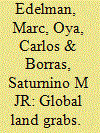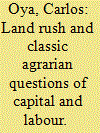|
|
|
Sort Order |
|
|
|
Items / Page
|
|
|
|
|
|
|
| Srl | Item |
| 1 |
ID:
124908


|
|
|
|
|
| Publication |
2013.
|
| Summary/Abstract |
Scholars, practitioners and activists generally agree that investor interest in land has climbed sharply, although they differ about what to call this phenomenon and how to analyse it. This introduction discusses several contested definitional, conceptual, methodological and political issues in the land grab debate. The initial 'making sense' period drew sweeping conclusions from large databases, rapid-appraisal fieldwork and local case studies. Today research examines financialisation of land, 'water grabbing', 'green grabbing' and grabbing for industrial and urbanisation projects, and a substantial literature challenges key assumptions of the early discussion (the emphasis on foreign actors in Africa and on food and biofuels production, the claim that local populations are inevitably displaced or negatively affected). The authors in this collection, representing a diversity of approaches and backgrounds, argue the need to move beyond the basic questions of the 'making sense' period of the debate and share a common commitment to connecting analyses of contemporary land grabbing to its historical antecedents and legal contexts and to longstanding agrarian political economy questions concerning forms of dispossession and accumulation, the role of labour and the impediments to the development of capitalism in agriculture. They call for more rigorous grounding of claims about impacts, for scrutiny of failed projects and for (re)examination of the longue durée, social differentiation, the agency of contending social classes and forms of grassroots resistance as key elements shaping agrarian outcomes.
|
|
|
|
|
|
|
|
|
|
|
|
|
|
|
|
| 2 |
ID:
124911


|
|
|
|
|
| Publication |
2013.
|
| Summary/Abstract |
This paper has two main objectives. First, to address the problematic of the socioeconomic impact of land deals in sub-Saharan Africa by looking at what we know from the available literature so far, namely what has been claimed and how much research has been done, as well as why we do not know very much despite the quantity of material published. This is done via a systematic scoping review, which aims to avoid some of the biases inherent in conventional literature reviews and to provide evidence for some basic features of the emerging research on land grabs in Africa, with specific reference to their contribution to the understanding of livelihood impacts. Second, the article links empirical questions about the impact and implications of land grabs with a discussion of alternative (neglected) research questions, notably the implications of the current land rush phenomenon for the classic agrarian questions of capital and labour, as understood in agrarian political economy. Thus the paper proposes a re-engagement with debates on the classic agrarian questions in a Marxist political economy tradition in order to move the land grab research agenda towards more conceptually and empirically challenging research questions.
|
|
|
|
|
|
|
|
|
|
|
|
|
|
|
|
| 3 |
ID:
084471


|
|
|
|
|
| Publication |
2008.
|
| Summary/Abstract |
This paper presents some results from the largest rural labour market survey yet conducted in Mozambique. Evidence from three provinces shows that labour markets have a significant impact on the lives of a large number of poor people, and that employers exercise considerable discretion in setting wages and conditions of casual, seasonal and permanent wage employment. The evidence presented comes from a combination of a quantitative survey based on purposive sampling with other techniques, including interviews with large farmers. The findings contrast with ideas that rural labour markets are of limited relevance to poverty reduction policy formulation in Africa, and the paper concludes with methodological, analytical and policy recommendations.
|
|
|
|
|
|
|
|
|
|
|
|
|
|
|
|
| 4 |
ID:
145188


|
|
|
|
|
| Summary/Abstract |
Drawing on examples from rural Ethiopia and Uganda, this research note highlights some of the difficulties experienced in fieldwork. These difficulties do not justify the reluctance of increasingly risk-averse universities and funders to support independent fieldwork in Africa, but they do show that the rationale for research and the features of its design can provoke animosity and tensions. They also show that our own failure on occasion to appreciate local political dynamics made the situation more difficult. Challenges and threats came not only from local political forces but also from multinational companies and Fairtrade organizations uncomfortable with our findings and with fully independent research. The research note argues that the details of our experience have a practical value for other researchers, and that at least some of them should be treated as substantive forms of evidence and insight, rather than simply as threats or failures. We conclude that some crude best-practice norms and pressures on academics to form partnerships to conduct policy-relevant work may undermine the potential for truly independent and intensive field research. However, crises should not necessarily be seen as an unwelcome interruption to smooth processes of research; they can illuminate the context and power relations that the research is trying to understand.
|
|
|
|
|
|
|
|
|
|
|
|
|
|
|
|
|
|
|
|
|